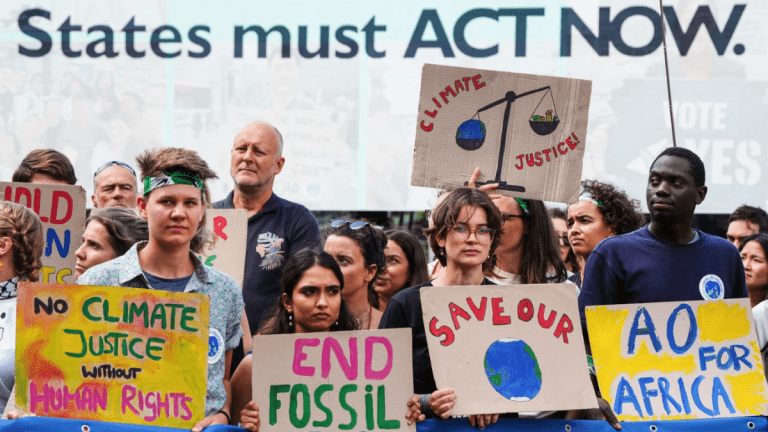
🕒 Last updated on July 24, 2025
In a powerful ruling that could shape the future of climate action, the world’s highest court—the International Court of Justice (ICJ)—has declared that countries that fail to act against climate change may be legally forced to pay reparations.
UN Court Issues Historic Ruling on Climate Responsibility
This means that if a country does not take steps to reduce pollution from fossil fuels like coal, oil, and gas, it could be held responsible and made to pay for the damage caused.
The ruling came after years of effort by small island nations and campaigners who have long argued that the biggest polluters are causing harm to people and nature around the world. In a packed courtroom in The Hague, the ICJ shared a 133-page advisory opinion saying countries must protect the environment and prevent climate harm. It warned that ignoring this duty could count as a “wrongful act” under international law.
While this ruling is not legally binding like a regular court judgment, it is still considered highly important because it reflects what existing international law already says. Countries are now on clear notice: if they don’t do enough to stop climate damage, they could be forced to rebuild destroyed communities or pay financial compensation.
Fossil Fuels at the Center of Legal Attention
Burning fossil fuels is one of the primary causes of climate breakdown, the court stated unequivocally. It pointed out that governments that continue to give licenses for oil or gas drilling or provide subsidies for fossil fuels could be breaking international law. These actions, if found to cause harm, could result in lawsuits or demands for restitution.
🌍 Climate collapse ahead? Norway’s $1.6 trillion fund warns of 19% U.S. portfolio loss
Even though the Paris Agreement, created in 2015 to fight climate change, did not originally mention fossil fuels directly, this new opinion changes the picture. The court said that damage from fossil fuels can no longer be ignored and countries must act responsibly, regardless of their previous legal commitments.
Importantly, the ICJ also ruled that governments are responsible not just for their own actions but for what companies within their borders do. If private companies pollute or harm the climate, and the government fails to control them, that state could still be held accountable. The court said countries must create strong rules to stop harmful corporate behavior and protect people and the environment.
This ruling opens the door for more legal claims in the future. Victims of floods, droughts, and other climate disasters could now demand help and support from countries that caused or worsened the crisis. Reparations could involve rebuilding homes, restoring forests, or even paying money to affected communities.
Climate Change and Human Rights Now Interlinked
The verdict also discusses the connection between human rights and climate change. The ICJ said that a clean and safe environment is essential for basic human rights like the right to life, health, food, water, and shelter. Without a healthy climate, it becomes harder for people to survive and thrive.
🧨 “Subsidizing the Killing”—NATO Slams China for Quietly Funding Russia’s War
The court emphasized that all countries—whether or not they signed climate treaties—must act in line with broader international laws. This means that even if a country decides to leave global climate agreements, like the Paris Accord, it still has a duty to protect the environment under other laws. That includes rules about sustainable development, fairness between generations, and working together globally to solve problems.
During the hearings, the court listened to many countries, especially smaller and more vulnerable ones, who said they are suffering the worst effects of climate change caused by others. The court agreed that climate harm is not just a national problem—it’s a global issue that needs global cooperation. But that does not mean individual countries can escape responsibility. Each state must take action, and those who don’t may face legal consequences.
This is the largest climate case the ICJ has ever heard. Other global courts have recently issued similar opinions, saying that countries must protect their people from climate change. But the ICJ’s role is special because it helps bring together all international laws and ensures they work in harmony. That’s why this ruling carries so much weight.
Countries that have done little to cut emissions are now under pressure. If their actions—or inactions—lead to climate disasters in other places, they could be held legally responsible. Courts could order them to fix the damage or pay money when recovery is not possible.
🧱 Finland builds world’s largest sand battery — and it’s heating homes without oil or pollution
This judgment is being welcomed by many around the world as a major win for justice and the environment. It gives a clear legal tool to communities and nations affected by climate damage. While the journey ahead remains tough, one thing is now clear: ignoring the climate crisis can come with a serious cost.